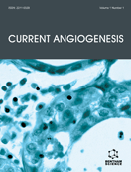Abstract
Gastrointestinal [GI] malignancies are common and frequently lethal neoplasms. As our understanding of GI cancers deepens, more pathways are discovered that play key roles in tumorigenesis and metastasis. Angiogenesis has emerged as a critical pathway in many cancers, particularly in GI cancers. The discovery of a complex network of signals, including vascular epithelial growth factor [VEGF], led to the emergence of a new class of cancer therapies targeting angiogenesis. Bevacizumab was the first to emerge, gaining US Food and Drug Administration [FDA] approval in 2004 for the treatment of advanced colorectal cancer; since then, several antiangiogenic agents have become clinically available, and numerous others are in clinical or preclinical testing. This review will focus on anti-angiogenesis therapies in GI malignancies.
Keywords: Anti-angiogenesis, bevacizumab, GI cancer, tumor angiogenesis, Tyrosine kinase inhibitor, VEGF.
Graphical Abstract
 20
20

